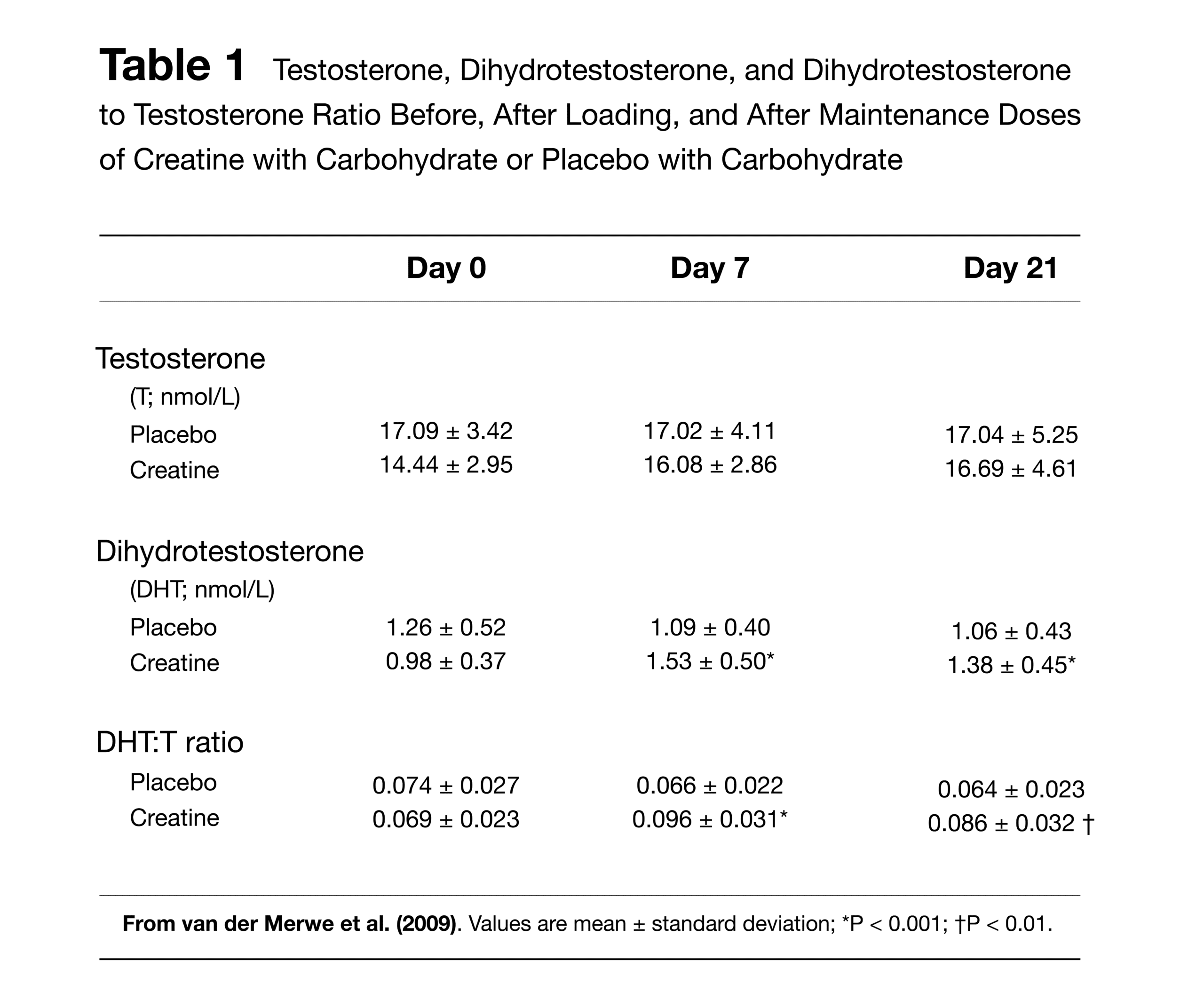[ad_1]
A pair weeks in the past, we revealed a research spotlight protecting the results of creatine on muscle progress. Once we posted it on social media, the replies had been awash with a standard query: does creatine actually trigger hair loss?
If you discuss creatine on the web, it’s nearly assured that somebody will carry up hair loss. There are lots of widespread considerations, myths, and bits of unsubstantiated hypothesis about creatine, however none of them appear to be fairly as fashionable as the concept creatine will make you go bald.
So, on this article, I’d like to debate the place the concept got here from, and why you most likely don’t must be involved about creatine inflicting hair loss.
Why do folks suppose that creatine causes hair loss?
In brief, the hormone DHT (dihydrotestosterone) has been implicated in hair loss, and a single research recommended that creatine raises DHT ranges.
DHT is loads like testosterone. Your physique truly synthesizes DHT from testosterone, through the 5ɑ-reductase enzyme. DHT and testosterone have related results within the physique – they bind to the identical receptors (androgen receptors), and upregulate expression of the identical genes. Nonetheless, DHT has about 5-times higher affinity for androgen receptors, so per unit of hormone, DHT has a lot bigger results than testosterone itself.
DHT is (no less than partially) accountable for lots of the physiological adjustments you expertise throughout puberty. Most notably for the needs of this text, DHT has pronounced results on hair follicles. DHT is basically accountable for the maturation and progress of facial, physique, and pubic hair. Nonetheless, it’s additionally closely implicated in androgenic alopecia (which was known as “male sample baldness,” although it additionally impacts females). Actually, many of the fashionable medicine folks take to stop hair loss are 5ɑ-reductase inhibitors – they cease the conversion of testosterone to DHT. In the event you can cease your physique from producing DHT, the development of androgenic alopecia slows manner down, stops completely, or (typically) reverses barely.
So, if severely lowering DHT ranges can cease hair loss, issues that enhance DHT ranges should enhance hair loss … proper?
That’s the priority folks have after they find out about a 2009 study by van der Merwe and colleagues.
On this crossover research, 16 younger rugby gamers took both creatine or a placebo for 3 weeks. Following a 6-week wash-out part, the preliminary placebo group took creatine for 3 weeks, and the preliminary creatine group took the placebo for 3 weeks. The creatine supplementation protocol consisted of 25g of creatine per day for one week (a loading part), adopted by 5g of creatine per day for 2 weeks (a upkeep part). The researchers measured serum (i.e. blood) testosterone and DHT ranges earlier than the beginning of every 3-week part, after the loading part, and on the finish of the upkeep part.
Lengthy story brief, creatine supplementation appeared to extend serum DHT ranges and DHT:testosterone ratios each throughout the creatine part itself, and when put next towards the placebo part.

So, this discovering has led to some concern that creatine will increase DHT ranges, DHT causes hair loss, and due to this fact creatine will trigger hair loss.
However is that basically the conclusion we must always draw from this research?
Assuaging considerations about creatine, DHT, and hair loss
Stage 1 – fundamental analysis criticism
When sciency people attempt to allay the fears of people who find themselves involved that creatine causes hair loss, there are some things they’ll sometimes level out about this research.
First, this is only one comparatively small research. There aren’t another research exhibiting that creatine will increase serum DHT ranges (although, within the curiosity of transparency, it’s price noting that no different research have even measured the potential affect of creatine on DHT). It’s normally not price getting too labored up in regards to the outcomes of a single small, non-replicated research.
Second, different analysis that has measured the affect of creatine on serum androgen ranges has usually failed to search out a lot of an impact. There have been 12 research measuring the impact of creatine on whole testosterone ranges, and 5 research measuring the impact of creatine on free testosterone ranges (free testosterone is the testosterone that will truly get transformed to DHT). 10 of the 12 research measuring free testosterone ranges, and all 5 of the research measuring free testosterone ranges failed to detect a significant effect.
Third, this research didn’t truly assess hair loss. All the concern relies on the idea that since DHT is implicated in androgenic alopecia, will increase in serum DHT ranges function a legitimate and dependable proxy for androgenic alopecia danger.
Fourth, the noticed adjustments in DHT ranges had been all comparatively small fluctuations throughout the regular vary. Serum DHT ranges in males are usually between 0.47-2.65 nmol/L. So, even when creatine did enhance DHT ranges, it didn’t push DHT ranges significantly near the highest of the traditional physiological vary in these topics.
Fifth, it’s not completely apparent that creatine supplementation did truly enhance serum DHT ranges. This was a crossover research, that means the identical topics accomplished each arms of the research (each the creatine and placebo circumstances). So, you’d count on baseline (week 0) measures to be the identical in each arms of the research – you’re coping with the identical group of topics, and at baseline, there shouldn’t be something associated to the research that will be impacting their DHT ranges. Moreover, you shouldn’t count on a placebo to have an effect on DHT ranges. Nonetheless, that’s not what we see within the desk above. For unknown causes, baseline DHT ranges had been randomly ~20-25% decrease in the beginning of the creatine part than in the beginning of the placebo part. Equally, DHT ranges tended to lower within the placebo part for unknown causes. So, it’s arduous to be assured that creatine did truly enhance DHT ranges relative to placebo. The outcomes may have been pushed by (partially) random variability: the totally different adjustments over time had been statistically important, however precise DHT ranges weren’t meaningfully totally different when evaluating the beginning of the placebo part (1.26nmol/L) to the top of the creatine part (1.38nmol/L). So, did creatine truly enhance DHT ranges relative to placebo, or is that this discovering merely a false constructive, pushed by randomly low baseline DHT ranges within the creatine situation (which couldn’t be attributable to creatine supplementation), and random (non-significant) decreases in DHT ranges within the placebo situation (which additionally couldn’t be attributable to creatine supplementation)?
If it is a matter you’re acquainted with, I most likely haven’t but introduced any arguments or info you haven’t beforehand encountered. In the event you had been already skeptical of claims that creatine causes hair loss, you’re most likely nodding alongside whereas beginning to lose curiosity, as a result of that is all outdated hat to you. Equally, in the event you’ve performed a little bit of studying on this matter however you’re nonetheless satisfied that creatine causes hair loss, I most likely haven’t swayed your opinion, as a result of these are counterarguments towards the findings of the van der Merwe research that you simply’ve already encountered.
So, let’s shift gears and go a degree deeper, digging into materials that I’ve by no means seen mentioned within the dialog about creatine and androgenic alopecia. What if I advised you that this isn’t only a small, unreplicated research with considerably shaky findings? What if as a substitute, I advised you that this research is completely and utterly irrelevant to any dialogue of hair loss?
Stage 2 – the one research that’s even marginally associated to the subject is totally irrelevant.
The lone research folks cite to help a hyperlink between creatine supplementation and hair loss solely measured serum DHT ranges.
Serum DHT ranges are utterly irrelevant to hair loss .
I stumbled throughout this enjoyable little reality whereas doing analysis for our recent podcast episode on creatine myths and misconceptions. I used to be in search of dose-response research quantifying the connection between serum DHT ranges and prevalence or charges of development of hair loss, as a result of I needed to have the ability to inform folks how massive of a hair loss affect they need to count on from a ~0.5nmol/L enhance in serum DHT ranges (if we had been to imagine that we are able to take the outcomes of the van der Merwe research at face worth).
I saved placing out. I simply couldn’t discover any good research quantifying the connection between serum DHT ranges and hair loss. Actually, research after research reported that serum DHT ranges had been the identical in folks with and with out androgenic alopecia.
That’s once I stumbled throughout a 2018 review paper discussing how DHT truly causes hair loss. This overview helped the entire items fall into place:
“Males struggling [androgenic alopecia] have regular ranges of circulating androgens. Nonetheless, testosterone and DHT might be synthesized within the pilosebaceous unit by way of mechanisms that embrace a number of enzymes. The undesirable androgen metabolism on the hair follicle is the key issue concerned within the pathogenesis of [androgenic alopecia] … As no correlation between sample of baldness and serum androgen has been discovered, the pathogenic motion of androgens is prone to be mediated by way of the intracellular signaling of hair follicle goal cells.”
In brief, serum DHT ranges – the degrees of DHT in your blood – aren’t predictive of hair loss, and aren’t necessary for hair loss. Reasonably, the DHT that causes hair loss is the DHT produced in your hair follicles themselves.
Once we take into consideration hormones, we have a tendency to consider systemic hormones: hormones which can be largely or completely produced in a specific organ, launched into the bloodstream, and journey to distant tissues to exert their results. Insulin is a good instance: It impacts nearly all tissues of the physique, however it’s particularly produced by the pancreas. In case your muscle mass want insulin, they’ll’t simply make their very own. Testosterone is analogous – it’s largely produced within the testes in males (and a mix of the ovaries and adrenal glands in girls), after which it’s launched into the bloodstream so it could possibly journey all through the physique exerting its results.
DHT, then again, is primarily an autocrine and paracrine hormone. Autocrine hormones are hormones produced inside a cell for its personal use. Paracrine hormones are hormones that act in cells close to the place they had been produced.
The pores and skin – together with the pores and skin of the scalp – produces its own DHT. Testosterone diffuses into the cells of hair follicles, and people hair follicle cells then convert the testosterone to DHT, use the DHT to advertise androgenic variations (thickening of facial and physique hair, or thinning of scalp hair), after which break down the huge, overwhelming majority of the DHT they produce, in order that it by no means enters systemic circulation.
So, that explains why DHT may cause hair loss, regardless of folks with androgenic alopecia having regular DHT ranges. Systemic DHT isn’t the DHT that’s contributing to hair loss, so you’ll be able to expertise androgenic alopecia with completely regular serum DHT ranges. Moreover, nearly not one of the DHT that contributes to hair loss (DHT produced throughout the hair follicles) ever makes it into systemic circulation – it’s metabolized regionally throughout the hair follicle cells.
Let’s circle again to creatine now. There’s a single research probably exhibiting that creatine will increase serum DHT ranges, and that’s it. Nonetheless, even when creatine does enhance serum DHT ranges, that’s utterly uninformative about creatine’s results on hair loss, as a result of androgenic alopecia isn’t attributable to, and even related to, elevated serum DHT ranges.
As an analogy, utilizing serum DHT as a proxy for danger of hair loss is like utilizing international murder charges to foretell your probability of being murdered in your individual neighborhood. The components that affect native violent crime charges are nearly completely separate from the components that will affect violent crime globally. You’re in the end trying on the identical measure (murder charges) on totally different scales, however international murder charges and native murder charges are nearly completely unrelated, and solely native knowledge could be informative about your precise degree of danger. In a lot the identical manner, scalp and serum DHT ranges are influenced by various factors, they’re nearly completely unrelated to one another, and solely scalp DHT ranges could be informative about your danger of creating androgenic alopecia.
Lengthy story brief: Even when we uncritically accepted the findings of the van der Merwe research at face worth, and we confidently asserted that creatine positively will increase serum DHT ranges, that also wouldn’t indicate that creatine will increase your danger of hair loss.
Maximal skepticism
Simply to anticipate a little bit of pushback this text is prone to generate, I’m not conflating absence of proof with proof of absence. I’m not confidently asserting that creatine doesn’t enhance your danger of androgenic alopecia (as a result of there isn’t proof clearly demonstrating that creatine doesn’t enhance your danger of androgenic alopecia). I’m merely mentioning that there’s not presently a great cause to count on that it would enhance your danger of androgenic alopecia.
In different phrases, there’s simply as a lot proof each for and towards the concept creatine causes hair loss as there’s for the concept consuming apples causes hair loss. Or that tending a backyard causes hair loss. Or that being a Taylor Swift fan causes hair loss. In different phrases, there isn’t any proof. Zero. Zilch. Nada.
So, in the event you worth your hair, I’d advocate treating creatine with the identical degree of concern you’d apply to consuming a contemporary honeycrisp, trimming the hedges, or listening to 1989 on repeat. In the event you don’t keep away from all of these issues as a result of there’s not conclusive proof that they don’t trigger hair loss, I’d advocate making use of an analogous rubric when assessing the danger that creatine will trigger hair loss.
Wrapping it up
In the event you’d like a extra in-depth and conversational dialogue of this matter (together with a couple of different myths and misconceptions associated to creatine), try our recent podcast episode. And in the event you’d prefer to dive additional into the analysis on androgenic alopecia, try the show notes of the episode. We went down fairly a couple of rabbit holes associated to the mechanistic underpinnings of androgenic alopecia that go nicely past the scope of this analysis highlight.
In the event you’d prefer to be taught extra about creatine, yow will discover our in-depth information on creatine supplementation here, and our current article about creatine’s results on muscle progress here.
[ad_2]
Source link








